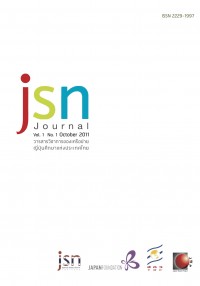การพัฒนากฎหมายและการมีส่วนร่วมของ ภาคประชาชนในการจัดการปัญหาพลังงานนิวเคลียร์ ของประเทศญี่ปุ่น : บทเรียนต่อประเทศไทย
Main Article Content
Abstract
ความสำเร็จในการนำพลังงานนิวเคลียร์มาใช้ในญี่ปุ่นนั้น ประกอบด้วยปัจจัยหลัก 3 ประการ คือ (1) นโยบายพลังงานที่เน้นความสำคัญในการใช้พลังงานนิวเคลียร์อย่างมาก โดยเน้นหลักการสำคัญ 3 ประการ อันสะท้อนผลประโยชน์แห่งชาติอย่างแท้จริง คือ ความมั่นคงของพลังงาน (Energy Security) การเจริญเติบโตทางเศรษฐกิจ (Economic Growth) และการคุ้มครองสิ่งแวดล้อม (Environmental Protection) (2) การพัฒนากฎหมายที่เกี่ยวกับพลังงานนิวเคลียร์ได้อย่างรอบด้าน สามารถครอบคลุมและส่งเสริมการพัฒนาพลังงานนิวเคลียร์ได้อย่างแท้จริง มีการเชื่อมโยงนโยบายนิวเคลียร์ให้มีผลชัดเจนโดยการตราและบังคับใช้กฎหมายเกี่ยวกับนิวเคลียร์ที่ครอบคลุมและรอบด้าน (3) การมีส่วนร่วมของภาคประชาชน ไม่ว่าจะเป็นการสนับสนุนหรือต่อต้านในการก่อสร้าง โรงไฟฟ้านิวเคลียร์ ล้วนแต่เป็นการเปิดโอกาสให้ประชาชนเข้ามา มีส่วนร่วมได้อย่างแท้จริง โดยไม่มีลักษณะตายตัว (No one model fits all) โดยอาศัยช่องทางหลัก คือ การปกครองส่วนท้องถิ่นที่ เข้มแข็งและเป็นอิสระ และบทบาทของผู้นำระดับท้องถิ่นและประเทศ และปัจจัยอื่นๆ ที่เกี่ยวข้อง เช่น การเมืองญี่ปุ่นที่ให้ความสำคัญต่อนโยบายพลังงานนิวเคลียร์ การประสานงานอย่างดีระหว่างหน่วยงานของรัฐและเอกชนที่เกี่ยวข้อง เป็นต้น
Legal development and People’s Participation in the Managements of Nuclear Power’s Problems in Japan : Lessons for Thailand
Chanwit Chaikan
The Office of the Administrative Courts of Thailand
The success of the use of nuclear power in Japan is based on 3 following main factors. (1) Energy policy extremely emphasizes the use of nuclear power. For public interest, Japan has carried out energy policy by aiming to the use of nuclear power, which is based on “3 Es” principle, e.g. Energy Security, Economic Growth and Environmental Protection. (2) Law related to nuclear power has been developed comprehensively by truly covering and promoting nuclear power development. Legislation and law enforcement concerning nuclear power policy have been very relative and effective. And (3) People’s participation, by either supporting or opposing the construction of nuclear power plants, has actually been the way to give people any chance to take part in the nuclear power policy. Japan has decided to take people’s participation approach by which no one model fits all. The appropriate approach has relied on the strength and independence of local autonomy, the charismatic local and nation leader, and other related factors, such as the cooperation between public and private sectors in the management of nuclear power and the advancement of nuclear technology from overseas and domestic private companies.
Article Details
ข้อความและข้อคิดเห็นต่างๆ ในบทความเป็นของผู้เขียนบทความนั้นๆ ไม่ใช่ความเห็นของกองบรรณาธิการหรือของวารสาร jsn Journal


